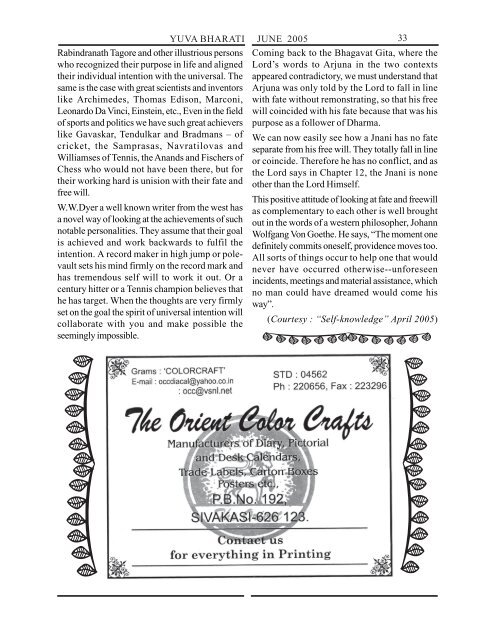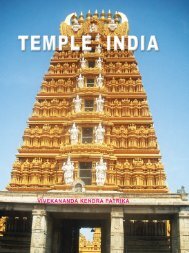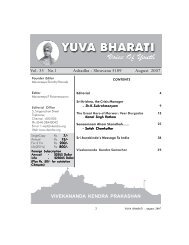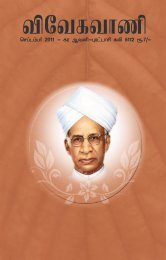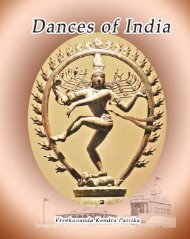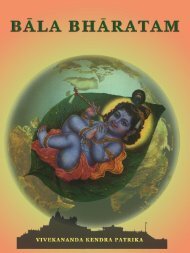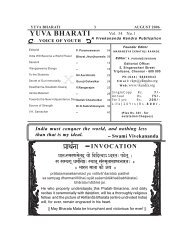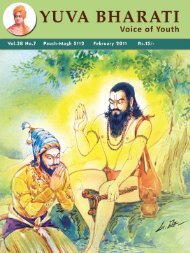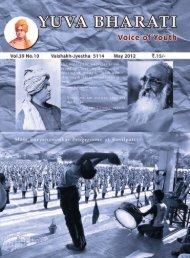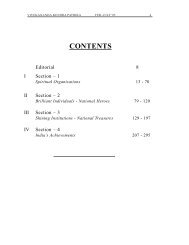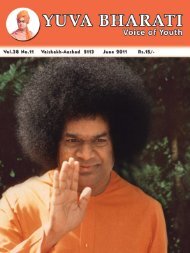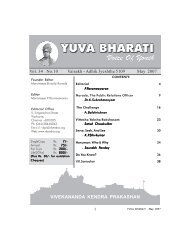YUVA BHARATI - Vivekananda Kendra Prakashan
YUVA BHARATI - Vivekananda Kendra Prakashan
YUVA BHARATI - Vivekananda Kendra Prakashan
Create successful ePaper yourself
Turn your PDF publications into a flip-book with our unique Google optimized e-Paper software.
<strong>YUVA</strong> <strong>BHARATI</strong> JUNE 2005<br />
Rabindranath Tagore and other illustrious persons<br />
who recognized their purpose in life and aligned<br />
their individual intention with the universal. The<br />
same is the case with great scientists and inventors<br />
like Archimedes, Thomas Edison, Marconi,<br />
Leonardo Da Vinci, Einstein, etc., Even in the field<br />
of sports and politics we have such great achievers<br />
like Gavaskar, Tendulkar and Bradmans – of<br />
cricket, the Samprasas, Navratilovas and<br />
Williamses of Tennis, the Anands and Fischers of<br />
Chess who would not have been there, but for<br />
their working hard is unision with their fate and<br />
free will.<br />
W.W.Dyer a well known writer from the west has<br />
a novel way of looking at the achievements of such<br />
notable personalities. They assume that their goal<br />
is achieved and work backwards to fulfil the<br />
intention. A record maker in high jump or polevault<br />
sets his mind firmly on the record mark and<br />
has tremendous self will to work it out. Or a<br />
century hitter or a Tennis champion believes that<br />
he has target. When the thoughts are very firmly<br />
set on the goal the spirit of universal intention will<br />
collaborate with you and make possible the<br />
seemingly impossible.<br />
33<br />
Coming back to the Bhagavat Gita, where the<br />
Lord’s words to Arjuna in the two contexts<br />
appeared contradictory, we must understand that<br />
Arjuna was only told by the Lord to fall in line<br />
with fate without remonstrating, so that his free<br />
will coincided with his fate because that was his<br />
purpose as a follower of Dharma.<br />
We can now easily see how a Jnani has no fate<br />
separate from his free will. They totally fall in line<br />
or coincide. Therefore he has no conflict, and as<br />
the Lord says in Chapter 12, the Jnani is none<br />
other than the Lord Himself.<br />
This positive attitude of looking at fate and freewill<br />
as complementary to each other is well brought<br />
out in the words of a western philosopher, Johann<br />
Wolfgang Von Goethe. He says, “The moment one<br />
definitely commits oneself, providence moves too.<br />
All sorts of things occur to help one that would<br />
never have occurred otherwise--unforeseen<br />
incidents, meetings and material assistance, which<br />
no man could have dreamed would come his<br />
way”.<br />
(Courtesy : “Self-knowledge” April 2005)


